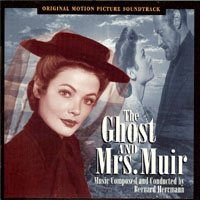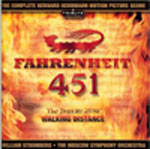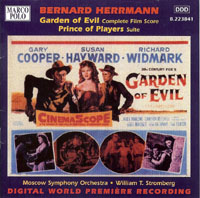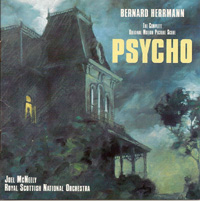By Steve Vertlieb: Elmer Bernstein once commented that, in his considered opinion, Bernard Herrmann and Miklos Rozsa were the two greatest practitioners of symphonic motion picture composition in the long history of the genre. The centennial of Herrmann’s birth was celebrated in 2011, and so we thought it appropriate, then, to commemorate his enormous contribution to the art of cinema by applauding some of his more outstanding works. While choosing merely ten scores by the composer to discuss is a daunting task, it is nevertheless the assignment for which we were chosen. For my own singular collection of titles, I have decided to include those Herrmann scores which have had the most profound emotional influence, and impact upon me. My reasons, as you will read, are purely personal, reflecting an unabashed affection for both the composer and his incomparable artistic legacy.

THE GHOST AND MRS. MUIR (20th Century Fox, 1947) – Among the most searingly romantic, and deeply sensitive scores ever composed for a motion picture, Herrmann’s outward bravado, as Elmer Bernstein tellingly observed in the documentary, Bernard Herrmann: Music For The Movies, was belied by the musical expression of his secret soul. For the timeless story of star crossed lovers, whose depth of passion for one another transcended mortal barriers, finding resolution at last, beyond the ethereal veil of eternal sleep, Bernard Herrmann composed, perhaps, his most profoundly beautiful score…a haunting, emotional masterpiece on wings of lyrical romanticism. The score, like the film that sired it, remains a gloriously tender rhapsody of idealized love and eternal devotion.
VERTIGO (Paramount, 1958) – Perhaps Herrmann’s masterpiece, as well as Hitchcock’s, this unforgettable film and score remain as arresting and fresh as when first released. Herrmann reached the zenith of his artistry with this heart breaking, Wagnerian score, filled with near operatic aspirations and tonality. Once again, idealized love is frustrated to the point of madness as the woman of James Stewart’s dreams is lost to him, an apparent victim of suicide. Obsession drives him literally to the brink and back again, realizing the living specter of his dead love embodied in another woman. Herrmann’s music rises achingly to levels of exquisite torment as Stewart fights to recover both the woman he lost, and his own sanity.

FAHRENHEIT 451 (Paramount, 1966) – Ray Bradbury, an American treasure, lent his genius to the motion picture screen when Francois Truffaut filmed the visionary science fiction classic. A tale of intellectual and emotional repression, Bernard Herrmann masterfully captured and conveyed the longing of souls yearning for freedom with his beautiful score, particularly expressed in the hauntingly eloquent final track, “The Road,” in which the chords of melancholy transition, from ashes to rebirth rise, as a phoenix of hope, in the rustling winds.
OBSESSION (Columbia, 1976) – Brian DePalma, who unashamedly found his own cinematic voice while emulating Alfred Hitchcock, filmed his own singular masterpiece in tribute to the Master’s Vertigo. A ghostly apparition of the earlier film, Obsession is, nonetheless, a stunningly erotic tale of romantic love lost, as Cliff Robertson (channeling James Stewart) finds his dead wife once more, seemingly reincarnated as a young Italian girl he meets at an art gallery. Consumed with her uncanny likeness to his deceased bride, he blindly and selfishly works to recreate the past and restore her to his personal happiness. Herrmann, having lost none of his sentimental heart, fills the soundtrack with one of his most deeply felt and passionate scores for this hauntingly psychotic story of love and betrayal. Reportedly, Herrmann wept openly when viewing the finished picture. It would be, sadly, his next to last work for the screen.
NORTH BY NORTHWEST (MGM, 1959) – Bernard Herrmann was one of a gifted hand full of screen composers equipped to write a truly exciting main title sequence. The overture for this Hitchcock classic is as remarkable an achievement musically, as was Hitchcock’s stunning, accompanying visual text. David Raksin remarked that only “Benny” Herrmann could get away with using a Fandango for a theme. However one describes it, Herrmann’s opening title music for North By Northwest is an exhilarating roller coaster ride through a cinematic amusement park that sparks the flame for one of the most entertaining thrillers ever conceived, either by director or composer. The main titles set the uncertain stage and, like the fragile instability of exposure to an earthquake, we remain off center and on tilt for the remainder of the film. The exuberance and sheer vitality of the score weaves a dizzying maze from which neither Cary Grant nor the audience will soon recover.

GARDEN OF EVIL (20th Century Fox, 1954) – Herrmann proved himself as adept at writing period scores as he was at home with contemporary music. This Gary Cooper vehicle, despite its western setting, contained all of the elements of great drama…survival, greed, heroism, and lust. Bernard Herrmann obliged the studio by writing richly expressive, full bodied and expansive themes, filling his musical landscape with one of his most colorful scores. So visual was his thematic material that 20th Century Fox chose to use elements of this score, along with his comparable music for Five Fingers, as the basis for its stock music library, in trailers advertising the studio’s products for years to come.

PSYCHO (Paramount, 1960) – This is, unquestionably, among the most influential motion pictures scores since sound transformed the movies. Herrmann’s music for Hitchcock’s most grizzly, and infamous production, haunted both showers and bathroom tile for decades, foreshadowing countless succeeding scores, and contemporary composer’s inspiration. In the absence of Herrmann’s unforgettable presence, Psycho remains an excellent film. With the addition of his haunting main title music, and searingly abrasive accompaniment to murderous thrusts of a blade most “foul,” the picture becomes at once a masterwork of terror and, ultimately, poignant depravity. It is a testament to Herrmann’s power and inspiration that the score for Alfred Hitchcock’s most notorious motion picture is continually performed today by orchestras around the world.
FIVE FINGERS (20th Century Fox, 1952) – Written and Directed by Joseph L. Mankiewicz, and based upon the book Operation Cicero, this wartime thriller focused on the exploits of a renowned British spy. James Mason tendered his usual finely tuned, cultured, and dapper performance as the spy in the employ of the British Consulate, while Bernard Herrmann contributed the superb and thrilling themes that would add immeasurably to the suspense, and eventual undoing of the greedy, albeit brilliant, valet. As noted earlier, the generous thematic musical materials were used often in subsequent trailers, and television series produced by Twentieth Century Fox.
THE SNOWS OF KILIMANJARO (20th Century Fox, 1952) – Based quite loosely upon the story by Ernest Hemingway, this stirring production directed by Henry King became a thoughtful, poetic, heart breaking romantic melodrama centered upon the tragic consequences of indulgence, war and remembrance. For the main titles Herrmann composed one of the most thrilling preludes, perhaps, in the history of cinema. His opening theme is a startling revelation, pulsing with dramatic urgency, compelling the listener to follow in rapt, spellbinding attention. Herrmann’s raging overture is among the most exciting pieces of music in his career, or any other. Rarely has the screen produced so ravenous and intense a musical salutation.
JANE EYRE (20th Century Fox, 1944) – Charlotte Bronte’s sweeping novel offered the composer the groundwork for one of his most profoundly passionate and romantic scores. Alternately somber and rhapsodic, the tragic tale of a lonely heroine accepting a position as a governess at a Victorian mansion, lorded over by a dark, brooding widower, was the stuff of classic love, and legendary devotion. Beautifully directed by Robert Stevenson, and performed by Orson Welles and Joan Fontaine, the heroic grandeur of Bronte’s haunting adventure gave Bernard Herrmann wondrous license to explore the full breadth, and limitless horizons of his fierce, artistic palette. Herrmann’s lush, deeply sensitive translation of Bronte’s stormy romantic fantasy, awakened memories of love’s awesome power and beauty, expressed so eloquently by his tortured, yet exquisite musical tapestry.
Bernard Herrmann was a legendary force in Hollywood, contributing some of the most singularly remarkable music in motion picture history. Over a period of thirty five years, he composed the symphonic accompaniment and inspiration for our most treasured dreams and aspirations. If music is the light by which cinematic imagery is emotionally defined and illuminated, then Bernard Herrmann was the flame that danced atop the candle. Dominating the expressive, new art form, Herrmann’s massive contributions forever changed the way we listen to movies, turning a largely polite, arid background into a psychologically complex, meaningful exploration of character and definition. Herrmann was prolific in the concert hall, as well as related media. For television, he wrote the ethereal background music for Rod Serling’s bittersweet tale of childhood’s wonder lost in “Walking Distance” for The Twilight Zone. It was a memorable achievement in a rich lifetime of memorable achievements. On this, the one hundredth anniversary of his birth…we celebrate his life.
++ Steve Vertlieb, January 1, 2011
Discover more from File 770
Subscribe to get the latest posts to your email.

Pingback: AMAZING NEWS FROM FANDOM: July 9, 2023 - Amazing Stories
I would certainly include in such a list his score for Journey to the Center of the Earth (1959). The “Sunrise” sequence is one of the loveliest bits of music Hollywood ever produced.
Bernard Hermann’s music was covered extensively recently on “Exploring Music with Bill McLaughlin” on Chicago’s WFMT, at this link:
https://www.wfmt.com/programs/exploring-music/
I’d have to include one of his Harryhausen scores — either 7th Voyage of Sinbad or Jason & the Argonauts.
Back in the 70’s,my college roommate had an LP of Fantasy Film World of Bernard Herrmann. I made a copy on my reel-to-reel tape deck (later copied to cassette). Unfortunately, the tape did not survive the years.
A couple of years ago, I was delighted to find out it had been released on CD. It has selections from Journey To The Center Of The Earth, The Seventh Voyage Of Sinbad, The Day The Earth Stood Still and Fahrenheit 451.
I’m so happy to have it in my collection again.
I would have to pick his score for The Mysterious Island as my favorite, but it’s a difficult choice from an amazing selection of brilliant music.
@John Lorenz: I had that LP! I also had The Mysterious Film World of Bernard Herrmann, which contained excerpts from the scores for The Mysterious Island, Jason and the Argonauts, and The Three Worlds of Gulliver. Neither survived my transition to the digital era, unfortunately.
I have to include ALL of Herrmann’s Harryhausen scores. They were responsible for my love of film music. I too went through the Phase 4 collection starting with Fantasy Film World. They remain my favourite four.
Sir, what a delight to read this. BH afficionados probably know that the recording in 1975 of ‘The Ghost and Mrs. Muir’ was conducted by Elmer Bernstein. After purchasing the biography ‘A Heart at Fire’s Center’, I collected as many movies with his music as I could!
Thanks to Mr. Vertlieb and all of the commenters. They prompted me to pull out my Herrmann CD collection and do some binge listening today!